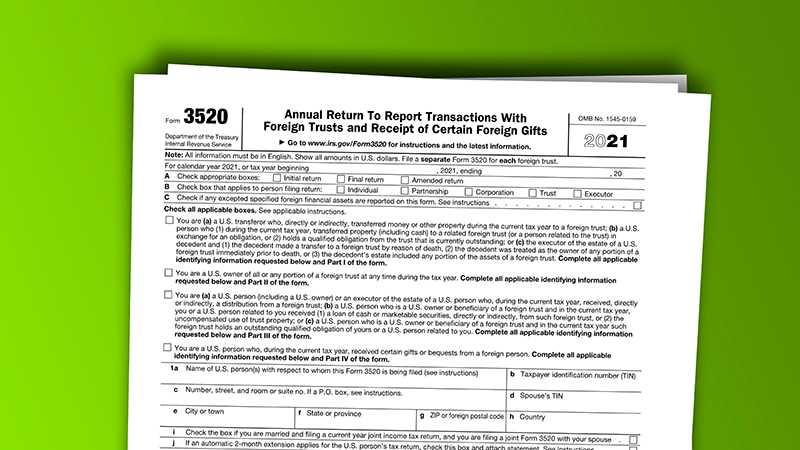Form 3520 foreign gift: step-by-step filing guide
Just How Reporting Foreign Inheritance to IRS Functions: Key Insights and Guidelines for Tax Coverage
Navigating the intricacies of reporting foreign inheritance to the IRS can be challenging. There are certain limits and forms that people have to understand to guarantee compliance. As an example, inheritances exceeding $100,000 from non-resident aliens need certain interest. Failing to comply with these guidelines might bring about fines. Recognizing the subtleties of tax obligation effects and necessary documentation is important. The following sections will detail vital understandings and standards for efficient tax obligation reporting.
Recognizing Foreign Inheritance and Its Tax Implications
It is crucial for them to comprehend the associated tax obligation effects when people obtain an inheritance from abroad. In the USA, inherited assets are usually exempt to earnings tax obligation, but the estate where the inheritance comes might have certain tax obligation responsibilities. International inheritances can make complex issues, as various nations have varying regulations relating to estate taxes. Individuals need to understand that while they might not owe taxes on the inheritance itself, they may be accountable for reporting the worth of the international asset to the Internal Earnings Service (IRS) In addition, currency exchange prices and evaluation approaches can affect the reported worth of the inheritance. Understanding these aspects is vital to stay clear of unforeseen tax obligation responsibilities. Seeking support from a tax specialist skilled in worldwide inheritance regulations can give quality and warranty conformity with both U.S. and international tax obligation demands.

Coverage Needs for Inherited Foreign Possessions
The reporting needs for acquired foreign possessions entail details thresholds and restrictions that taxpayers need to comprehend. Conformity with IRS laws requires the proper tax obligation kinds and understanding of potential charges for failure to report. Understanding these components is essential for people getting international inheritances to prevent lawful problems.
Reporting Thresholds and Limits
While passing through the intricacies of acquired international assets, comprehending the reporting limitations and limits established by the IRS is vital for conformity. The IRS mandates that U. Form 3520 foreign gift.S. taxpayers report international inheritances exceeding $100,000 from non-resident aliens or international estates. This limitation relates to the total value of the inheritance, incorporating all possessions received, such as money, realty, and financial investments. Additionally, any kind of international economic accounts amounting to over $10,000 should be reported on the Foreign Financial Institution Account Record (FBAR) Failure to stick to these limits can lead to considerable penalties. It is necessary for taxpayers to precisely analyze the worth of acquired international possessions to assure certified and timely reporting to the IRS
Tax Return Summary

Fines for Non-Compliance
Failure to adhere to coverage demands for acquired foreign possessions can lead to considerable charges for united state taxpayers. The IRS implements rigorous regulations pertaining to the disclosure of foreign inheritances, and failures can bring about penalties that are usually significant. Taxpayers may face a penalty of up to $10,000 for failing to submit Kind 3520, which reports foreign gifts and inheritances surpassing $100,000. Additionally, continued non-compliance can escalate charges, possibly rising to 35% of the worth of the acquired property. Additionally, failing to report can also trigger extra serious effects, consisting of criminal charges for willful disregard. Taxpayers have to continue to be watchful to avoid these effects by guaranteeing precise and timely coverage of international inheritances.
Trick Forms and Documents Needed
When a specific receives a foreign inheritance, it is vital to comprehend the crucial types and documentation needed for compliance with IRS guidelines. The primary kind required is the IRS Kind 3520, which should be submitted to report the receipt of the foreign inheritance. This type provides in-depth details concerning the inheritance, consisting of the identity of the foreign decedent and the worth of the inherited possessions.
Furthermore, if the acquired residential property consists of foreign savings account or our website various other financial assets, the person may need to submit the Foreign Checking account Record (FBAR), FinCEN Kind 114, if the total value exceeds $10,000. Correct documentation, such as the will or estate records from the foreign territory, must additionally be accumulated to substantiate the inheritance case. Keeping detailed documents of all communications and purchases connected to the inheritance is vital for accurate reporting and conformity with IRS needs.
Tax obligation Treaties and Their Influence on Inheritance Tax

Understanding the effects of tax treaties is essential for individuals getting foreign inheritances, as these contracts can greatly impact the tax obligations connected to inherited possessions. penalties for not filing Form 3520. Tax obligation treaties in between countries typically provide particular guidelines on exactly how inheritances are strained, which can lead to lowered tax obligation responsibilities or exemptions. For instance, a treaty might stipulate additional reading that specific kinds of inheritances are exempt to tax in the recipient's nation, or it may enable credit histories versus tax obligations paid abroad
Individuals have to familiarize themselves with the particular provisions of pertinent treaties, as they can vary substantially. This expertise aids guarantee conformity with tax regulations while maximizing prospective advantages. Additionally, comprehending just how treaties engage with domestic laws is crucial to precisely report foreign inheritances to the IRS. Consulting with a tax expert skilled in worldwide tax obligation regulation might be a good idea to browse these intricate guidelines successfully.
Typical Blunders to Avoid When Reporting Inheritance
Numerous people believe they can easily browse the complexities of reporting international inheritances, they usually forget important information that can lead to substantial errors. One common blunder is falling short to report the inheritance in the right tax obligation year, which can cause penalties. Additionally, some individuals forget to transform international properties right into U.S. bucks at the appropriate currency exchange rate, ultimately misstating their value. Another constant oversight includes misinterpreting the reporting limits; individuals may think they do not require to report if the inheritance is below a certain amount, which is inaccurate. Furthermore, misclassifying the kind of inheritance-- such as dealing with a present as an inheritance-- can make complex reporting obligations. Finally, people usually stop working to maintain complete paperwork, which is essential for confirming cases and avoiding audits. Recognition of these pitfalls can substantially enhance conformity and decrease the danger of economic repercussions.
Looking For Expert Aid for Complicated Scenarios
Navigating the ins and outs of reporting international inheritances can be daunting, particularly for those with intricate economic circumstances. People encountering issues such as several international properties, varying tax ramifications throughout territories, or complex family members dynamics may take advantage of professional aid. Tax obligation specialists specializing in global tax regulation can give very useful insights right into the nuances of IRS regulations, making certain compliance while minimizing possible liabilities.
Involving a cpa (CERTIFIED PUBLIC ACCOUNTANT) or tax obligation lawyer with experience in foreign inheritance can aid make clear coverage requirements, determine applicable exemptions, and strategize finest tax techniques. They can help in finishing essential types, such as Form 3520, and taking care of any additional disclosure requirements.
Inevitably, seeking specialist support can minimize stress and anxiety and improve understanding, allowing people to concentrate on the emotional aspects of inheritance rather than becoming overwhelmed by tax intricacies. This positive strategy can bring about more favorable results over time.
Often Asked Questions
Do I Required to Record Foreign Inheritance if I'm Not a united state Citizen?
Non-U.S. citizens generally do not need to report foreign inheritances to the IRS unless they have details links to united state tax obligation legislations. It's suggested to get in touch with a tax expert to make clear private situations.
Are There Charges for Failing to Report Foreign Inheritance?
Yes, there are charges for stopping working to report international inheritance. People might encounter substantial fines, and the IRS might impose extra effects for non-compliance, possibly affecting future tax obligation filings and monetary standing.
Can I Subtract Expenditures Connected To Taking Care Of Inherited Foreign Assets?
Costs connected to managing inherited international possessions are usually not insurance deductible for tax obligation purposes. Nevertheless, individuals ought to consult a tax obligation expert for assistance customized to their details scenarios and possible exceptions that may use.
Just How Does Foreign Money Influence the Worth of My Inheritance Report?
Foreign money fluctuations can substantially affect the reported worth of an inheritance. When transforming to U.S - penalties for not filing Form 3520. bucks, the currency exchange rate at the time of inheritance and visit site reporting determines the final reported value for tax objectives
What Occurs if My Foreign Inheritance Is Kept In a Trust?
It might complicate coverage needs if a foreign inheritance is held in a depend on. The trust fund's framework and tax implications have to be assessed, as beneficiaries can face differing tax obligation obligations based upon jurisdiction and depend on type.
The Internal revenue service mandates that United state taxpayers report international inheritances going beyond $100,000 from international estates or non-resident aliens. In addition, any kind of international economic accounts totaling over $10,000 have to be reported on the Foreign Bank Account Record (FBAR) Individuals acquiring international properties should generally report these on Kind 8938 (Declaration of Specified Foreign Financial Properties), if the total value exceeds specific thresholds. Depending on the nature of the inheritance, various other types such as Kind 3520 (Annual Return To Record Purchases With Foreign Trusts and Receipt of Certain Foreign Presents) might also be needed. In addition, if the inherited building consists of international bank accounts or other economic properties, the person may need to submit the Foreign Financial institution Account Report (FBAR), FinCEN Kind 114, if the overall value surpasses $10,000.